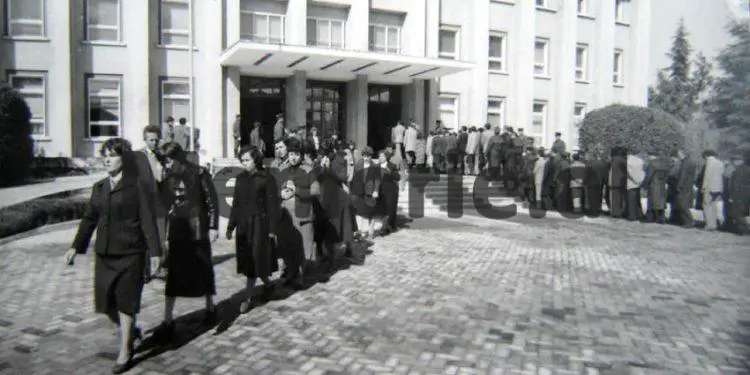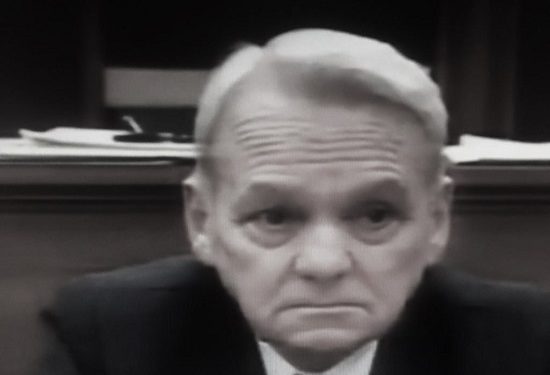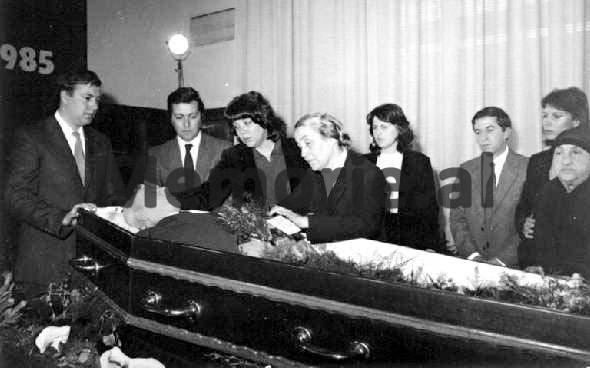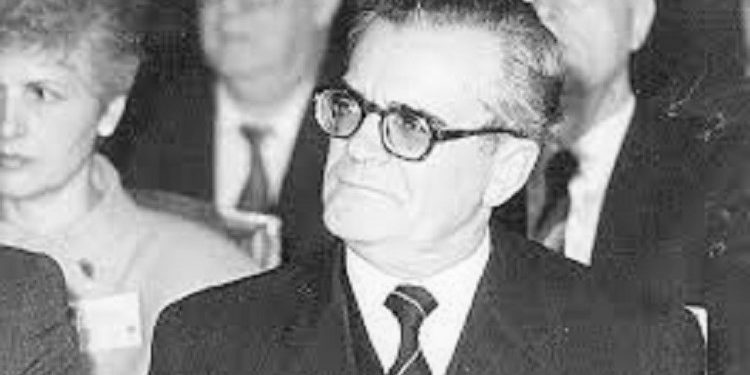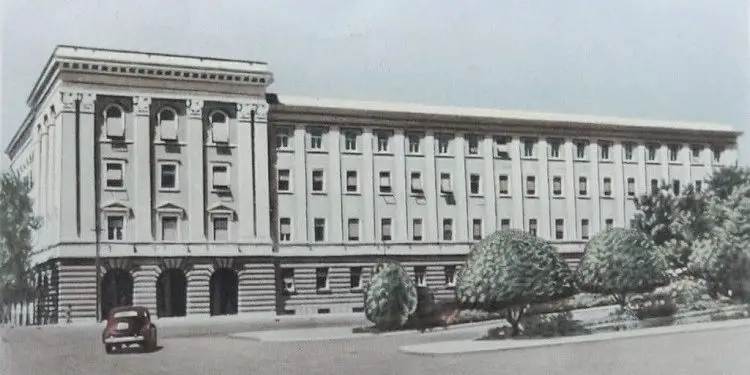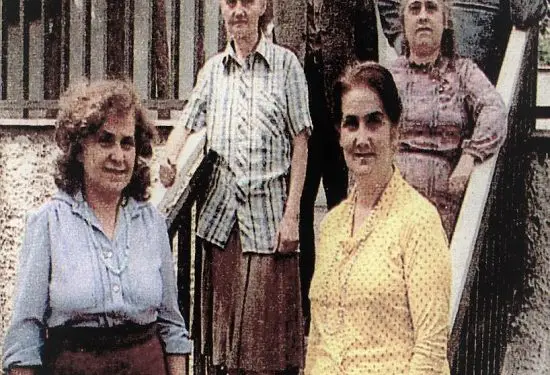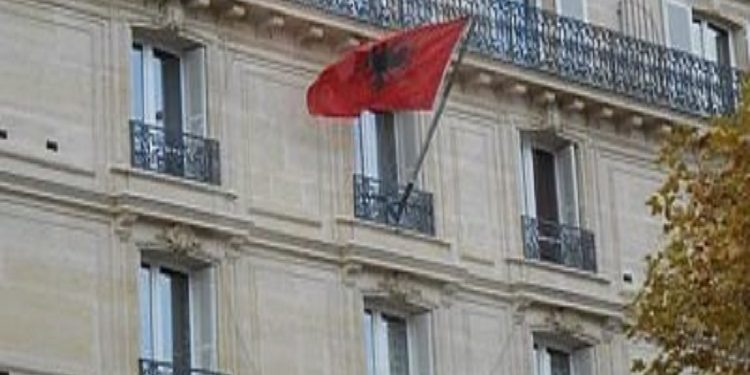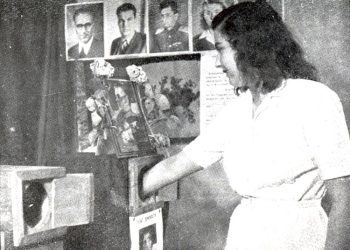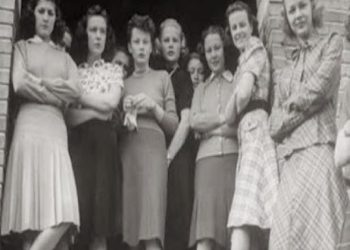By Arqile Semini
The first part
Memorie.al / On the day of the celebration of November 29, 1984, we who happened to be near the main tribune, very close, saw and understood that Enver Hoxha’s days were numbered. None of us, the comrades of the Foreign Directorate of the PPS Central Committee apparatus, dared to have an ominous thought, to mention it in front of others, not even with the office mate. We on the camera watched, heard and understood some signals about Comrade Enver’s health, but no one commented. Some out of fear, or care to protect themselves from harmful things, some out of desperation for the great disaster that was waiting for the Party and our country, others out of habit, to deal with their work. Over time, even when we understood a clear signal, say when we noticed for days and weeks, that Nexhmije Hoxha did not come to the office, we got used to the habit, so as not to think that Enver Hoxha was sick.
Even on Tuesday, April 9, 1985, when he fell into a coma and we noticed frequent movements of Party leadership cars, we, some of the friends of the Foreign Directorate, went to drink from a glass at the buffet of the Artificial Lake. These pleasant meetings were occasionally and for some time, organized for us by the oldest friend of the Directorate, whom we called “Dad”. The day before, he had ordered a crock pot fritter. We enjoyed ourselves, without any regrets. The next day when we went to work, “Dad” called us as usual to his office, to inform us socially about the illness of Comrade Enver.
We all probably thought the same thing, looking at each other: none of us had mentioned anywhere, the work of the Tirana frying pan…! Now I don’t remember well when and who informed us at Aparat about the serious condition of Enver Hoxha. Only two days later (two days of agony), dawning Thursday, when we were called in the night to appear in the office, we realized that He was finished! We gathered in “Baba’s” office to listen to the radio, which would deliver the terrible news.
There were only one third of the friends of the Foreign Directorate; the others were with services in the districts of the country or abroad. They had already been notified to return urgently to Tirana! Through the corridors of the Apparatus, a deep grave silence reigned. People passed by with their heads down and did not dare to look their friend in the eye. Most of the employees were locked in their offices.
After hearing the sad news on the radio, everyone went to their office. The office mate, D.D., or “Leaf”, as “Dad” called him, came after ten minutes. He found me smoking a cigarette, without any file open in front of me, that is, not as usual. “Leaf”, sat in front of his desk, in front of me. We saw each other eye to eye for a while, without speaking. Finally, I got up, threw a key to the door and motioned to him from the closet to take out the bottle of brandy, and after a while I said to him: “Do it, you deserter, because poison, poison requires.”
My friend from the office lightly put his lip on the gas and a little later, when he returned the glass, he said: “You’re great, Xhan i Qakos”! I realized at this moment that “Gjethi” now knew me exactly, or now he was making sure that I was a man of faith! In fact, both he and I needed such an atmosphere, where we could feel ourselves released (when untying the collar), or relieved from the weight of the great worry that the moment imposed. Both he and I hoped that; now with Ramiz Ali, a new wind would begin, a new opening for the country and for the people…!
We hoped! And such a hope, which was general or partial, brought some closer to each other, while it alienated some from their old friends, who did not think like them. This thing was felt not so clearly, in those days of national mourning…! I saw many people crying, I calculated with my mind, how many could be of those thousands and thousands of people, who shed tears of despair, for the loss of the Great Leader and how many others there were, who shed tears because they were parting with an era…?!
Self-isolation wall
On May 25, 1985, I was officially notified of the transfer to Paris. In the embassy, I would replace the political adviser, Kujtim Hysenaj, who after a year would be appointed ambassador in Belgrade. I had known the memory for a long time. Working with foreign delegations had brought us closer. For Memory, I had a special respect. He had remained modest with his friends, although he had married a girl from a family of the high hierarchy of the Party and the State. The fact that I was replacing Kukitim in the post was another evaluation of the Party for me, that I had no support.
A few days after I had started preparations at the Ministry of Foreign Affairs, the Minister himself, Reis Malile, received me in the office. The meeting was warm, not only due to the fact that I came from the Central Apparatus of the Party. I knew that Reisi had some kind of sympathy or consideration for me, but I had always respected him. The Minister told me that he had given instructions that an accelerated preparation program would be made for me at the Ministry, because I “was an experienced fellow who knew France and the outside world”.
I studied the French files carefully. I devoted the most time to them. I left the other issues for the end. In France’s files, there were many reports and analyses. I noticed a negative spirit in most of the conclusions. I was inclined to look for the positive side. A certain indifference of the French government towards Albania was emphasized everywhere. Bilateral relations seemed almost frozen. These were aggravated by the recent incident in our southern waters, with the Frenchman, who was a member of the “Mediterranean” club, killed.
But, they got worse, with the death of Enver Hoxha. The French mass media had written and spoken very badly about Enver Hoxha, they had called him; “Red Sultan”, “The Last Stalinist”, “Criminal”, etc. In this campaign, they confused the president of the Friendship Association, Professor Pol Miljezi, who was Enver’s doctor. Professor Miljezi, a well-known personality, had fallen victim to a misunderstanding and it took a long time for this matter to be clarified.
However, in France’s latest file, I saw a glimmer of hope for a rewarming of bilateral relations. Talks had begun for a French delegation from the Ministry of Foreign Affairs, which was supposed to visit Albania soon. Our side insisted that the delegation be of a high level. Until then, no French Foreign Minister had come to Albania, after the Second World War. The taste of that, which was left in me by reading the documents on relations with France, was softened a little by the meetings I had with high-ranking officials from different departments, before I left. The meeting with Hekuran Isai, at that time Minister of the Interior, left a good impression on me.
Among other things, he told me that; The Political Bureau and Comrade Ramiz were careful to single out France, because out of the four allies during the Second World War, only France as a Great Power remained the country with which we maintained ties. As a second issue, he said, in France, our leadership was treated. And third, Paris was the capital, where many interests of East and West intersected. The same words were said to me in the Central Committee of the Party and in the Ministry of Foreign Affairs…! At the same time, France was the foreign country where we had the largest number of Albanian students and postgraduates abroad.
The “Popa” and “Papavrami” families!
From the first meetings I had with counterpart diplomats, I noticed that those of the neighboring countries, especially Italy, showed special interest in Albania and this was connected with the hopes for a possible opening of our country, now after the death of Enver Hoxha . This finding encouraged me a lot in my job as a political advisor.
In particular, I established close relations with the Italian counterpart. The work arrived (not to my credit, be careful!) within three months, after I had arrived in Paris, the two ambassadors with the advisers of Albania and Italy, mutually passed through their embassies lunch, together with the women, in a very warm atmosphere and indeed in a brotherly way…!
But our “party” didn’t last long…! In December 1985, the story of the Popajs took place, which was holed up in the Italian embassy in Tirana. I was sorry for this event, because it disrupted the diplomatic activity of our embassy. With the Italian counterparts, relations cooled down completely and we did this with instructions from Tirana. In the hand that had written some of these instructions, I seemed to notice a slight tremor of satisfaction at what happened to the Italian embassy in Tirana.
For the first time, maybe not so clearly, I understood that; our “wall of isolation” was too strong. In this conclusion, I sought to find as justification; “bureaucratic attitudes and to be ‘within the line'” on the part of the bosses, big and small, who ran our diplomacy. I did not believe, at that time, that President Ramiz Alia himself was completely in agreement with those bureaucrats, and I expected him to give a quick solution to the Popaj case. Unfortunately, it didn’t turn out the way I hoped!
As if the Popaj case in Tirana was not enough, the “Papavrami case” broke out in Paris a few weeks later. It was an ordinary day, when around nine o’clock in the morning, the ambassador called me and, in a slightly worried voice, told me to come down to his office right away. My mind went to some criticism from Tirana, about our work with journalists. In the office, I found Maxhun (the ambassador) and the embassy’s first secretary (Eqerem Gaxhollin) standing. They looked shocked.
Maxhun gave me to read the letter of the Papavrams, with which they explained the reason why they had decided to stay in France. All their “sacrifice” was justified by the desire to create optimal conditions for their talented son, Ted, in a word, the opportunity to make a career. After reading the letter, I wanted to reassure my friends, telling them that; “there were things that happened and now, we have to think, how to overcome the created situation”! I stood still, looking at Eqerem, to be safe from the “braves”, who emerge from such situations, especially from his sector.
It took me some time to deal with the Papavrami “issue”. Together with the ambassador, we went to a meeting with his mother and Ted Çunak, at the Ministry of Foreign Affairs. The meeting was held in the presence of the lawyers of the Papavrami family. Sometime later, on orders from the Center, I took a trip with Ylli Qamiran, towards the south-west of France, where I went near Bordeaux, to a village where the Papavrami family settled.
But the local authorities did not allow me to meet with them, my fellow citizens, of course on orders from Paris. Regarding this issue, a strict telegram came from our Foreign Ministry, charging our ambassador with responsibility, for lack of vigilance, especially since we had not announced in time, the unexpected arrival in Paris of Tedi Papavram’s father.
I noticed that Maxhuni (the ambassador) was hesitating to give an answer to the Ministry. I insisted that he immediately answer the Ministry that Tirana had not asked us at all when it had given the visa to Ted’s father and that we found out that he had come to Paris, almost “incognito” – as we he said himself, supposedly to surprise his friend, when he himself came to the embassy.
Later, we clarified this issue with Minister Reiz Malile, and he was the one who told us that even the Foreign Ministry itself did not know anything about Ted’s father’s visa. The Ministry of the Interior issued him a visa. A little later, we also found out that this issue had been discussed ‘Up’ in the Party leadership, and that things were messed up, but finally, the issue of Ted’s father’s visa was left in silence.
This story with the Papavrami family, who took refuge in France as political refugees, seemed to us to be a challenge from the French side, a kind of pressure, to promote the desired opening of the West for Albania. It was a not-so-precise and not-so-clear conclusion. The “Popaj” case and the “Papavrami” case, were they related to each other…?!
With the mentality of “revolutionary vigilance”, one can find a logical connection between the two issues. Who could know?! However, I did not mind so much, to enter the analysis, which previously required some elements of knowledge from the field of secret discoveries, which I did not know. However, I discerned a fundamental difference between the two issues. The first issue tested the strength and determination of the principles of the “Self-Isolation Wall”.
As for the second issue, of the Papavrams, due to the implications of the large families in Tirana, it seemed to me that in the meantime, there was some silent cooperation between the Albanian and French sides. I could not understand that; what was the real position of Ramiz Ali in these matters…?!
Reluctance to interview
The desire to receive interviews from the President of the Republic, or from senior leaders of the Party and our state, was a constant request of analysts and foreign journalists. But, always for this request, we received the same dry answer from Tirana that the interview was not in the practice of the President, the Prime Minister, etc. Ian Maxwell, the son of the great English press tycoon, who was also involved in the French mass media, made a strong insistence on this matter.
Ian, together with two well-known French journalists, came twice to the embassy, proposed the topic of conversation for the interview with Ramiz Ali, promised that he would publish this interview in his big magazine, “International”, known in the whole world, at the same time, with the interview of some western personality, like; Kissinger, or of the East.
In this world-renowned political magazine (this he repeated over and over again, as if to convince us), Ian Maxwell had published interviews with most of the presidents of the largest states in Europe, America and from other continents others. We made all these data known to the ‘Center’. For the second time, we received a negative response. Ian Maxwell, he had no luck…!
The editor of the well-known French illustrated magazine, “Figaro Magazin”, Robert Lacontre, also insisted on the issue of an interview with our President. This was presented to me by an old friend, the French photojournalist, Michel Setbun, who prepared thematic photographs for several large American and European illustrated magazines. He had been in Albania and had published an extensive photographic reportage, accompanied by written text and published in a major magazine in the German language.
On the other hand, when he saw that an interview with the President was impossible, he insisted on doing this, with other Albanian dignitaries, but up to the rank of Minister. Finally he went to Albania, made a full tour in many deep areas of the north and south, together with Setbuni. Meanwhile, Lakontre had received a recommendation from me to request an interview with the president’s advisor, which I had informed Tirana about.
The counselor waited for him, had a simple conversation with him, but refused to call it an interview…! However, Lakontre and Setbuni returned somewhat satisfied from their trip to Albania, which they reflected in an extensive photographic reportage, accompanied by an article published in the magazine, “Figaro Magazin”. Memorie.al
(*Former diplomat in Paris, from 1985-1991)
The next issue follows




